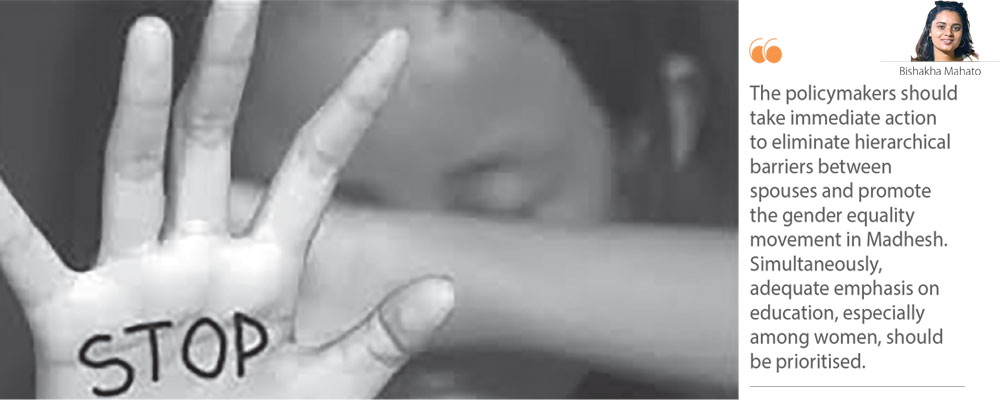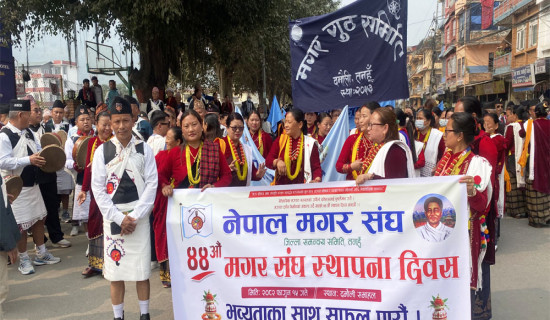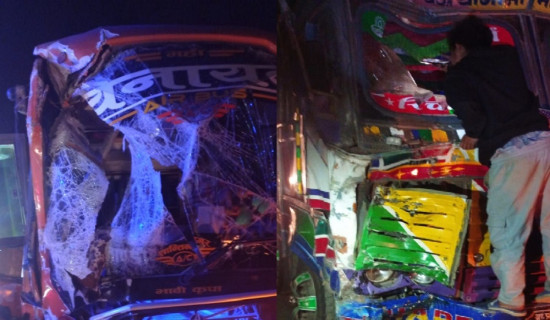- Saturday, 28 February 2026
Violence Haunts Madhesh Women
Violence is directly connected with power, whether it is political, economic, or social. It prevails when the power is not regulated properly. In Nepal, cases of violence against women are higher compared to men. More precisely, when we look at Madhesh province, the situation is often more devastating, which is due to the lack of education and gender-based power structures, discriminatory and harmful cultural practices, and the social environment created and protected by the orthodox patriarchal structure. Besides many acts of violence against women, intimate partner violence against women (IPVAW) is a serious issue that has become more common since the COVID-19 pandemic. A higher risk of intimate partner violence against women (IPVAW) is linked to a multitude of factors, including the husband's level of education and occupation, the number of children, property ownership, alcohol use, relationships and arguments with the partner, fear of the husband, and participation in decision-making, according to univariate analyses. It is the most prevalent human rights violation across the world.
There is a Convention on the Elimination of All Forms of Discrimination Against Women (CEDAW) adopted by the UN that establishes equal access and opportunities for women in political and public life, including the ability to vote, as well as in the areas of employment, health, and education, which has created the framework for achieving gender equality. Similarly, the Constitution of Nepal has also become a milestone in the journey to gender equality. It has provisioned the special rights of women, the right to equality, the right to justice, and the right to social security, among others, as fundamental rights. Despite having these provisions, the women of Madhesh province are not safe, and they are the victims of intimate partner violence. Every day, there are many cases registered against the different kinds of domestic violence, which are in the form of physical, psychological, and sexual abuse. Based on the data of the criminal investigation department of the Nepal Police from July/August 2021 to June/July 2022, out of the 17000 domestic violence cases registered across the country, the highest number of cases are seen in Madhesh, which is 4473. Among the registered domestic violence cases like sexual abuse, physical, economic, aggression, psychological, mental, and verbal abuse, most of the cases are registered by women against their intimate partner. These issues have created both short- and long-term physical, economic, and psychological consequences for women and girls.
Intimate partner violence against women is a new concept in Nepal. It is also one of the most prevalent forms of gender-based violence, which is very common in our society but is not disclosed to every victim. Here, the behaviour of an intimate partner or ex-partner results in physical, sexual, or psychological harm. This includes domineering, physically aggressive, and sexually coercive behaviours. This is among the most prevalent types of violence against women worldwide. Physical acts of violence like choking, slapping, or burning are some examples of intimate partner violence. Sexual acts of violence also include rape of the spouse. Psychological acts of violence include fear instilled by intimidation or forced isolation. Finally, economic acts of violence include maintaining complete control over financial resources, denying access to funds, and/or prohibiting attendance at work or school. These are all forms of intimate partner violence. Every day, intimate violence happens everywhere throughout the world, regardless of social class, religion, or racial or cultural background. It is the most pervasive type of violence against women that occurs.
The current study conducted by Dalal K, Wang S, and Svanström L on high intimate partner violence against women in Nepal shows that out of 4210 women of reproductive age (15–49) years, the prevalence of emotional intimate partner violence against women was 17.5 per cent, physical intimate partner violence against women was 23.4 per cent and sexual intimate partner violence against women was 14.7 per cent. Overall, the prevalence of IPVAW in Nepal was 32.4 per cent. Joint decision-making for contraception, husband's non-controlling behaviour towards wives, and friendly feelings emerged as less likely to be IPVAW perpetration. Similarly, another study was conducted in the local community of Madhesh, where out of 20 women, only two were happy with their partner, and the remaining 18 women were not satisfied with their relationship. But still, they are in a relationship just because of their children and societal pressure. Many cases and stories are hidden and untold. We can easily observe that women are not able to live their lives with dignity and self-respect.
Many people in society always try to make the victim feel guilty for the continuation of the thoughts and behaviours created by patriarchal thinking and play a supporting role in building the base for protecting the perpetrator and encouraging them. Despite the constitutional guarantee ensuring a life free of violence and coercion, women and girls are not safe. It is due to a lack of effective implementation of laws and the politicisation of power.
For the past thirty years, the Globe has been observing the 16 Days of Activism against gender-based violence from November 25 to December 10. This is celebrated in Nepal too. However, the news of various forms of violence against women from home to school, the office, and public places is increasing instead of decreasing. This campaign allows people to raise awareness of this serious human rights violation and unite in calling for its abolition. This worldwide call to action emphasises how vital it is to stop violence against women and girls everywhere because there is never a secure place to live. Lifetime and current intimate partner violence is common and unacceptable. Therefore, concerned bodies will need to design and implement strategies to transform traditional gender norms, engage stakeholders, empower women, and integrate services to prevent violence against women.
Looking at and analysing all these facts, the situation of women`s violence in Madhesh province is very terrible. To overcome this, it is necessary to transform harmful gender values so that social attitudes towards women will change. Women should also be aware of the violence and the rights that have been ensured by the Constitution so that they can advocate for themselves instead of depending on someone else. The trend of victim blaming should be stopped so that victims can easily share their problems and come out of those problems.
The findings have immense policy importance. The policymakers should take immediate action to eliminate hierarchical barriers between spouses and promote the gender equality movement in Madhesh. Simultaneously, adequate emphasis on education, especially among women, should be prioritised. Governments, civil society organisations, advocates for women's rights, youth-led organisations, development partners, trade unions, and employers' associations should work together to create a Nepal where all people can live in safety and dignity, regardless of gender or any intersectional identity.
(Mahato is pursuing higher education in Conflict, Peace and Development Studies.)









-original-thumb.jpg)







